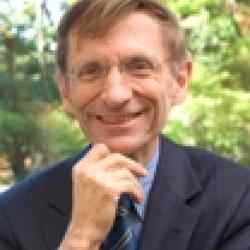
Bill
Bill Drayton is a social entrepreneur with a long record of founding organizations, bringing big change, and service. As a student, he founded organizations ranging from Yale Legislative Services to Harvard’s Ashoka Table, an inter-disciplinary weekly forum on how society truly works. After graduation from Harvard, he received an M.A. from Balliol College in Oxford University and his J.D. from Yale Law School. Over ten years at McKinsey & Company, he brought significant structural changes to policy and organizations. He also taught at Stanford Law School and Harvard’s Kennedy School of Government. He served in the Carter Administration White House and as Assistant Administrator at the Environmental Protection Agency, where he launched emissions trading and many other lasting reforms. He launched Ashoka in 1981. He used the stipend he received when elected a MacArthur Fellow in 1984 to devote himself fully to Ashoka. Bill is Ashoka’s Chair and Chief Executive Officer. He is also chair of three other organizations; Youth Venture, Community Greens, and Get America Working!
Bill has won numerous awards and honors throughout his career. He has honorary doctorates from Yale, NYU, and others; and he is a Fellow of Balliol College, Oxford. He is a member of the American Philosophical Society, the American Academy of Arts and Sciences, and the Council on Foreign Relations. He was selected one of America’s Best Leaders by US News & World Report and Harvard’s Center for Public Leadership. Other awards include the Yale Law School’s highest alumni honor, the National Wildlife Federation’s Conservation Achievement Award International; and the National Academy of Public Administration National Public Service Award.
Bill is an avid backpacker. He especially loves long, off trail, above the tree line immersions.
As Ashoka’s CEO, Bill brings history-based vision and a deep grasp of how things work to help Ashoka keep learning and keep changing big time so that it and its community can make the truly big contributions it can and must. He has overall management responsibility and, as one of three members of the Leadership Team, has special responsibilities for Purpose Teams (e.g. Young People, Climate), “Jujitsu” Partners and Metro Areas, Frame Change/Communications, organizational evolution, and Search/Talent.
(photo: (c) Yusuke Abe)
Ashoka Fellow Edward Edilbi - Syria

Ashoka Fellow Edward Edilbi - Syria (elected 2014)
The name of Edward’s organization, Dubarah, means “I’ve got your back” in Arabic. Since 2013 it has been empowering those forced by conflicts in Iraq and, chiefly, his own Syria, to flee to unknown places, giving up all. After becoming a refugee himself, Edward leveraged his background in marketing and communications and built a web platform that mobilizes the Syrian diaspora—old and new—into active mutual support networks. Edward’s goal is to enable newly arrived refugees to avoid despondency and the selfishness born of desperation by quickly becoming successful contributors to, not burdens on, their new host communities. Such success brings respect, not sour resentment—which further accelerates the new arrival’s progress.
Edward, who was a self-supporting entrepreneur at 16 and then studied communications at the University of Damascus, designed Dubarah to build trusting communities both face-to-face and online. There are guides to 36 countries prepared by 1,800 contributors designed to help refugees master what they need to know—from culture to visa requirements.
Edward's “employ/partner with a Syrian refugee” campaign had 8,000 jobs listed and 4,000 filled in a few months—and 420 funding and 520 partnership opportunities realized. Dubarah also offers educational, housing/roommate, volunteer, and social opportunities. Several thousand in his Energy Relief Team are ready for crisis response.
And sharing success stories helps build confidence. In its first year, Dubarah impacted 250,000 Syrian refuges across the world. Edward is now introducing a mobile extension of the site and plans to introduce a directory of participants’ professional skills to make cross-connecting easier.
Edward was forced to leave his first place of refuge, an Arab country perhaps not eager to see refugees self-organizing. Ashoka’s mutual help security program and Ashoka Canada enabled Edward and his family to emigrate in 2016 to Canada, a huge talent gift to that country. He has already met with the Federal and Provincial Ministers of Immigration, advising them on the importance of government, citizen sector, and community groups collaborating and focusing well beyond refugees’ first year. As these meetings suggest, Edward knows that his model can and must apply to all refugee and similarly disadvantaged groups.
Dubarah sees refugees as change-makers, not as victims or as threats. This stands in contrast to the dominant approach across Europe, in which new arrivals are widely portrayed in the media and viewed by governments as nothing more than a giant problem. This has the potential to become a self-fulfilling prophecy, as refugees nd themselves shunned and isolated on the fringes of mainstream society, dependent on government support— rather than being constructive, entrepreneurial members of their new communities.”
—The Huffington Post